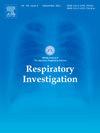Eosinophilic chronic rhinosinusitis as a predictor of super-responder and clinical remission in patients with uncontrolled type 2-high severe asthma treated with biologics
IF 2.4
Q2 RESPIRATORY SYSTEM
引用次数: 0
Abstract
Identifying which biomarkers and comorbidities of type 2 (T2) inflammation to focus on when selecting biologics has remained challenging. We retrospectively examined which biomarkers and comorbidities could influence asthma control among T2-high severe asthma patients receiving biologics. Patients without any maintenance oral corticosteroids and exacerbations requiring systemic corticosteroids indicated super-responder (SR). Clinical remission (CR) was defined as fulfilling the following criteria in addition to achieving SR: asthma symptom improvement (asthma control test score ≥23) and pulmonary function improvement (%forced expiratory volume in 1 s ≥ 80%). We initiated and switched biologics to achieve SR and CR. In total, 111 patients were evaluated, among whom 85.6% and 27.0%–50.5% demonstrated SR and CR, respectively. CR was more frequently observed among patients with severe eosinophilic chronic rhinosinusitis (ECRS) than among those without it. Attention must be paid to the existence of severe ECRS to achieve CR in patients with uncontrolled T2-high severe asthma.
嗜酸性慢性鼻窦炎作为生物制剂治疗未控制的2型高重度哮喘患者超反应和临床缓解的预测因子
在选择生物制剂时,确定2型(T2)炎症的生物标志物和合并症仍然具有挑战性。我们回顾性地研究了哪些生物标志物和合并症会影响接受生物制剂的t2高严重哮喘患者的哮喘控制。无任何维持性口服糖皮质激素和病情加重需要全身糖皮质激素的患者提示超反应者(SR)。临床缓解(CR)定义为除达到SR外,还满足以下标准:哮喘症状改善(哮喘控制测试评分≥23)和肺功能改善(1 s用力呼气量%≥80%)。我们启动和切换生物制剂以实现SR和CR。总共评估了111例患者,其中85.6%和27.0%-50.5%分别表现出SR和CR。重度嗜酸性粒细胞性慢性鼻窦炎(ECRS)患者的CR发生率高于无此症状的患者。t2 -高水平重度哮喘患者要实现CR,必须注意严重ECRS的存在。
本文章由计算机程序翻译,如有差异,请以英文原文为准。
求助全文
约1分钟内获得全文
求助全文

 求助内容:
求助内容: 应助结果提醒方式:
应助结果提醒方式:


